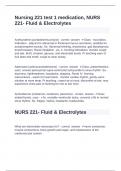Nursing 221 test 1 medication, NURS
221- Fluid & Electrolytes
Acetlcysteine (acetadote/mucomyst) - correct answer ✔Class - mucolytics.
Indication - adjunct for abnormal or thickened mucus secretions, antidote for
acetaminophen toxicity. Se. Abnormal thinking, drowsiness, gait disturbances,
bronchosoasm. Route inhalation , po, iv. Nursing indications: monitor cough
and tyle, BUN, creatine, glucose, and electrolyte levels. Pt teaching warn of
foul taste and smell, cough to clear airway
Adenosine (aclenocard/adenosine) - correct answer ✔Class: antiarrthymitcs,
uses: convert paroxysmal supra ventricular tachycardia to sinus rhythm. Se-
dizziness, lightheadness, hwadache, dyspnea. Route IV. Nursing
interventions - watch for heart block , monitor cardiac rhythm, gently warm
solution at room temp. Pt teaching : report ae at once, discomfort at site, may
experience chest pain or flushing for one to two mins
Aminodarone (cordarone, nexetrone, pacerone) - correct answer ✔Class
antiarrthymitc, uses - v fiv, unstable ventricular tachy, converts a fib to normal
sinus rhythm. Se- fstigue, malise, headache, bradycardia,
NURS 221- Fluid & Electrolytes
What are electrolytes necessary for? - correct answer ✔nerve conduction,
muscle contractions, bone growth and repair, and maintenance of the
cardiovascular system
, What are the three ESSENTIAL electrolytes? - correct answer ✔calcium,
potassium, and sodium
What is the most common cause of electrolyte imbalances? - correct answer
✔renal impairment
What is the normal range of sodium? - correct answer ✔135-145
What is the normal range for calcium? - correct answer ✔8.5-10.5
What is the normal range for potassium? - correct answer ✔3.5-5.0
What is the most abundant cation in the ICF? - correct answer ✔potassium
What is the most abundant cation in the ECF? - correct answer ✔Sodium
What is sodium extremely important for? - correct answer ✔Neuromuscular
physiology, acid-base balance, and overall fluid distribution
What is potassium extremely important for? - correct answer ✔Maintaining
acid-base balance & regulating osmolality
Hypernatremia? - correct answer ✔Red, flushed skin, dry mucus
membranes, increase thirst, edema, and hypertension
Hyponatremia? - correct answer ✔hypotension, lethargy, stomach cramps,
vomiting, diarrhea, and seizures




